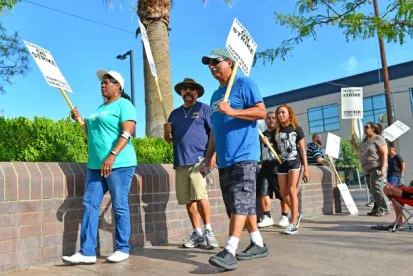In Glacier Northwest, Inc. v. Int’l Brotherhood of Teamsters Local Union 174, the Washington Supreme Court addressed the issue of whether a union is responsible for property damage incident to a strike. How does that issue arise? Let’s just suppose that your company is involved in a bitter labor negotiation with the unionized workforce. And let’s further suppose that in the midst of that bitter labor negotiation the union decides to strike. And then let’s further suppose that in the midst of that strike the striking employees damage company property through their planned activities to exert financial pressure on the company. Should the union be on the hook for the physical property damage caused? The Washington Supreme Court ruled no, and the U.S. Supreme Court is taking a look at that question, as well as whether the National Labor Relations Act (NLRA) protects the employees’ actions.
Background
The International Brotherhood of Teamsters Local Union 174 engaged in a strike against Glacier NW, Inc. in the state of Washington. Glacier is a ready-mix concrete company that uses mixing trucks for its delivery operations. The company alleges that the union waited until Glacier’s cement trucks were fully loaded and then called for a work stoppage for 16 drivers, knowing that the timing of the strike would result in the concrete hardening in the dump trucks, causing considerable damage to the trucks. According to Glacier’s filings, the coordinated sabotage produced “complete chaos” where they had to scramble to dispose of the concrete.
Glacier filed suit in state court against the union for the destruction of its property under various legal theories. The union filed its own complaint with the National Labor Relations Board (NLRB) that Glacier had committed unfair labor practices and also moved to dismiss Glacier’s court case arguing that the claims were preempted by the NLRA. The trial court dismissed the case.
The NLRA
The NLRA protects employees’ concerted activities and prohibits unfair labor practices. Under the NLRA:
-
“Employees shall have the right to … engage in other concerted activities for the purpose of collective bargaining or other mutual aid or protection” [29 USC § 157]
-
“It shall be an unfair labor practice for an employer — to interfere with, restrain, or coerce employees in the exercise of the rights guaranteed in section 157 of this title” [29 USC § 158]
So, the question is whether these NLRA provisions, as the federal labor legislation, preempt a state law claim for damages.
The Washington State Supreme Court Ruling
The Washington Supreme Court ruled that “incidental destruction” of company property during a strike was “impliedly” preempted by and protected by the NLRA and prevented the company from recovering damages. The court noted that the union’s conduct of intentional property destruction was “arguably protected” by the NLRA, so, absent some additional act of violence, the court must yield to the expertise of the NLRB. The opinion discussed how the NLRA would not preempt the state law claims if there had been intimidation or threats of violence. Ultimately, the court determined that Glacier’s trucks were not intentionally destroyed, so no exception applied, and Glacier’s state law claims were preempted.
Supreme Court Takes the Case – Stay Tuned
After Glacier sought review by the U.S. Supreme Court, the high court decided to accept the case. Glacier’s petition highlighted how the Washington Supreme Court decision conflicted with other federal and state courts and how the Supreme Court’s prior decisions have recognized that intentional property destruction is not protected by the NLRA.
How the Supreme Court analyzes this hot-button issue and the NLRA preemption provisions at the center will be revealing. Although concerted activity under the NLRA is well recognized, causing property destruction may cross the line for protection. We shall see.





 />i
/>i
